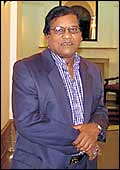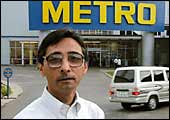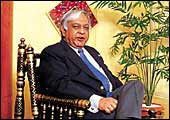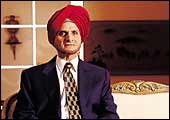|
 If
the buzz in Delhi is anything to go by, Sarthak Behuria,
CMD of Bharat Petroleum Corporation Ltd. (BPCL) may well get to
lead the country's biggest oil company, the Rs 1,30,392-crore Indian
Oil Corporation. That, however, doesn't mean there aren't other
contenders. Indeed, some of the heavyweights include Proshanto Banerjee
of GAIL and M.B. Lal of Hindustan Petroleum Corporation Ltd. Why
does the little bird in Delhi think Behuria may jockey ahead for
the post that will fall vacant due to incumbent M.S. Ramachandran's
wish to retire ahead of February 2005? Behuria, who took over as
BPCL Chairman in 2002, is credited with the oil company's marketing
success. That shouldn't surprise anyone. Behuria is probably the
only public sector CEO to have an MBA degree-that too from IIM-A.
And the government probably thinks it needs a savvy marketer to
steer its biggest oil company, now that the private sector is set
to emerge as a big challenger. Yet, Behuria had better not bet on
getting the job. If
the buzz in Delhi is anything to go by, Sarthak Behuria,
CMD of Bharat Petroleum Corporation Ltd. (BPCL) may well get to
lead the country's biggest oil company, the Rs 1,30,392-crore Indian
Oil Corporation. That, however, doesn't mean there aren't other
contenders. Indeed, some of the heavyweights include Proshanto Banerjee
of GAIL and M.B. Lal of Hindustan Petroleum Corporation Ltd. Why
does the little bird in Delhi think Behuria may jockey ahead for
the post that will fall vacant due to incumbent M.S. Ramachandran's
wish to retire ahead of February 2005? Behuria, who took over as
BPCL Chairman in 2002, is credited with the oil company's marketing
success. That shouldn't surprise anyone. Behuria is probably the
only public sector CEO to have an MBA degree-that too from IIM-A.
And the government probably thinks it needs a savvy marketer to
steer its biggest oil company, now that the private sector is set
to emerge as a big challenger. Yet, Behuria had better not bet on
getting the job.
 Round
One Round
One
Ever since the German cash-and-carry giant,
Metro, came to India in 2003, it has been dogged by controversies.
But now, there's some good news flowing its way-and from where it
matters the most. Last fortnight, the Delhi High Court allowed Metro,
which has two stores in Bangalore, to carry on with its wholesale
trade. Harsh Bahadur, Metro's MD in India, may have missed
his revenue target of Rs 450 crore, but now he's more confident
than ever. "We are looking at expanding into West Bengal,"
says Bahadur. He's won Round One of his battle. Now, for Round Two.
Russia Calling
 One
man's tragedy is turning out be another man's opportunity. Even
as Russia's oil tycoon Mikhail Khodorkovksy continues to cool his
heels behind bars, his now bankrupt oil company Yukos is being put
under the hammer. And one man who could be bidding for a piece of
it is ONGC's Subir Raha. The 57-year-old's company already
has a 20 per cent stake in the Shakalin oil and gas fields of Russia
that are set to start supplies in 2006. If his Yukos bid materialises,
Raha will have an even bigger piece of Russia's oil assets. That
will be another feather in the cap of a man who's planted the Indian
flag in half-a-dozen oil-rich nations like Libya and Sudan. One
man's tragedy is turning out be another man's opportunity. Even
as Russia's oil tycoon Mikhail Khodorkovksy continues to cool his
heels behind bars, his now bankrupt oil company Yukos is being put
under the hammer. And one man who could be bidding for a piece of
it is ONGC's Subir Raha. The 57-year-old's company already
has a 20 per cent stake in the Shakalin oil and gas fields of Russia
that are set to start supplies in 2006. If his Yukos bid materialises,
Raha will have an even bigger piece of Russia's oil assets. That
will be another feather in the cap of a man who's planted the Indian
flag in half-a-dozen oil-rich nations like Libya and Sudan.
 A
Year On Overdrive A
Year On Overdrive
It's been a busy year for Onkar Singh Kanwar,
Managing Director of Apollo Tyres. Middle of this year, Kanwar announced
a 51:49 joint venture (JV) for bus and truck radial tyres with French
giant Michelin. Then, he signed a deal with the Modis to manufacture
at their ailing plant, and last but not the least, he tied up with
Continental of Germany to set up a bus and truck radial tyres plant
in Vadodara. Now, Kanwar has landed the Presidentship of Federation
of Indian Chambers of Commerce and Industry (FICCI). "I do
have an agenda and I will lay it out when I officially take over
as President," Kanwar told BT when asked what he planned to
do at FICCI. But with a host of issues coming up next year, Kanwar
will probably have a busier year. As for the industry lobby, it
must be patting itself on the back for finally having got a President
whose business is actually doing very well.
Cigar Ace
 She
is only 23, but back home in la Romana in the Dominican Republic,
Jessica Maria Travieso Irizarry commands a lot of respect-not
because of who she is, but because of what she can do. And that
is to roll cigars like a Master Torcedor (or master roller), which
she is. In India courtesy Godfrey Philips, the Spanish miss went
around the major metros showcasing her skills to a wide-eyed audience.
"My experience shows that Indian cigar connoisseurs are keenly
interested in knowing how a cigar is rolled," Irizarry told
BT with the help of a translator. An MBA student, Irizarry can roll
about 150 cigars a day. If that seems too little, consider that
cigar rolling is a tedious seven-step process. If you didn't get
to meet the senorita, don't fret. She's promised to come back. She
is only 23, but back home in la Romana in the Dominican Republic,
Jessica Maria Travieso Irizarry commands a lot of respect-not
because of who she is, but because of what she can do. And that
is to roll cigars like a Master Torcedor (or master roller), which
she is. In India courtesy Godfrey Philips, the Spanish miss went
around the major metros showcasing her skills to a wide-eyed audience.
"My experience shows that Indian cigar connoisseurs are keenly
interested in knowing how a cigar is rolled," Irizarry told
BT with the help of a translator. An MBA student, Irizarry can roll
about 150 cigars a day. If that seems too little, consider that
cigar rolling is a tedious seven-step process. If you didn't get
to meet the senorita, don't fret. She's promised to come back.
 Cross-border
Dealmaker Cross-border
Dealmaker
Delhi-based private equity fund, Actis's Donald
Peck may have stayed off the CDMA game in India, but he's about
to plunge headlong into one in Pakistan. Along with two other local
investment groups, Peck, who runs a south Asia fund out of Delhi,
has picked up one-third of the $35-million (Rs 157.5 crore) equity
in a company called dvcom Ltd., which has bagged a nation-wide licence
to offer cdma-based mobile telephony. What's the attraction? One,
CDMA has a lower break-even level versus GSM, and two, Pakistan's
mobile telephony market is set to triple to 18 million in the next
five years. Says Peck, who's dealmaking in Pakistan after a gap
of three years: "The more underdeveloped the market, the greater
the CDMA appeal." Our local CDMA biggies will readily agree.
-Contributed by Ashish Gupta, Kushan
Mitra, Venkatesha Babu, E. Kumar Sharma and R. Sridharan
|
